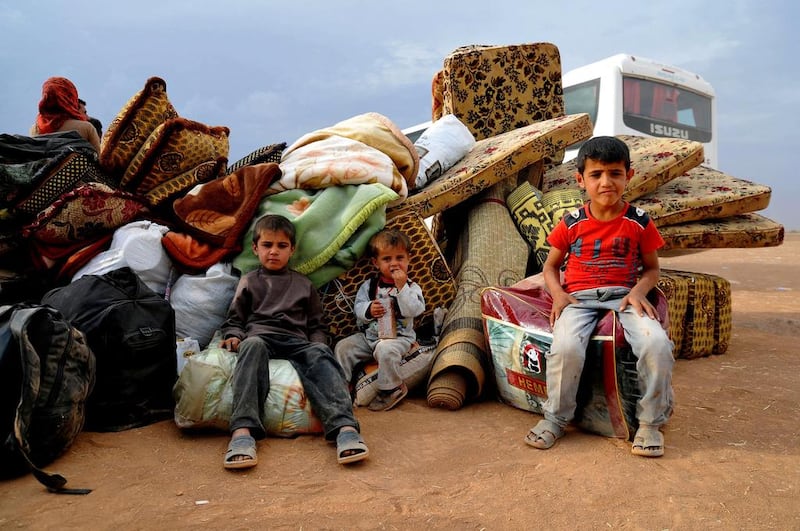KIZKALESI, Turkey // Small coves near this tourist resort on southern Turkey’s Mediterranean coast serve as launching pads for Syrian refugees desperate to make the dangerous journey to Europe.
“They come in by bus during the night,” Serafettin Ozyilmaz, a Turkish pensioner who has settled in Kizkalesi, 60 kilometres west of the port city of Mersin, said about the refugees.
In Kizkalesi, named for a medieval fortress built on an island close to the shore, several Syrian refugees wandered through the streets past restaurants and hotels, many of which are closed for the winter.
Some refugees were there hoping to find a boat that would take them to Europe, even though the perilous passage had cost many others their lives.
On January 16, a fishing boat took 140 Syrians from a small bay near Kizkalesi out to sea, where they were supposed to change onto a Togo-flagged freighter named the Burcin, bound for Italy, said an official at the nearby harbour of Kumkuyu.
Acting on a tip-off, the Turkish coastguard intercepted the Burcin, which already had 333 Syrian and Iraqi refugees on board, and stopped the fishing boat before its own refugees could board the freighter. While the Burcin was taken back to Mersin, the boat with the 140 refugees was guided to Kumkuyu, where the Syrians were detained. Turkey's Anatolia news agency said four Turks and eleven Syrians were arrested as suspected people smugglers.
The Burcin case and others have signalled a shift in tactics by people smugglers working to take Syrian refugees to Europe via Turkey. In the past, most refugees were brought to Turkey’s western Aegean coast to cross over to nearby Greece in small vessels, triggering tight controls by Turkish authorities there. In the first eleven months of last year, 11,890 refugees were apprehended in the Aegean region, according to local officials.
But in recent months, Mersin, and its surrounding towns, have become the centre of a new route for Syrian refugees trying to reach Europe in much larger ships.
Two freighters that began their journey in Mersin, and carried more than 1,000 refugees, arrived in Italy in early January.
Last fall, another 270 refugees on a ship from the port were rescued by the coastguard of Turkish northern Cyprus after an engine failure. Anatolia reported a total of 1,754 refugees trying to travel to Europe by sea were detained near the city last year.
Frontex, the European border agency, says people smugglers have been buying up decommissioned freighters in the area around Mersin. Before starting off towards Italy or Greece, the ships wait off shore while smaller fishing vessels bring refugees from the coast to board the freighters.
Syrian refugees are charged up to €6,000 (Dh24,700) each for the trip to Europe, according to Frontex. The freighters crammed with refugees have been dubbed “ghost ships” because in many cases the crew put the vessels on autopilot and abandon ship, leaving the refugees to their fate.
“Scrap vessels are expensive and difficult to procure, but high demand makes this method profitable,” Antonio Saccone, head of operational analysis at Frontex, said in a statement. “It shows how powerful and sophisticated the smuggling networks have become. There is no doubt that the Mediterranean coasts are now in serious crisis.”
Mersin lies just 160 kilometres west of the Syrian land border, and until a few months ago, a ferry service connected the city with the Syrian port of Latakia.
Frontex said this link made Mersin relatively easy to reach for tens of thousands of refugees.
Like many other Turkish cities, Mersin has attracted droves of Syrians fleeing a civil war in their country that has killed more than 200,000 people since 2011. Resat Asan, head of the Mediterranean section of the Turkish refugee aid organisation Goc-Der in Mersin, said Syrians made up around ten per cent of the city’s 800,000 people. Turkey has taken in almost two million Syrians in total.
“People are still coming, even if numbers are down from what they were before,” Mr Asan said. Goc-Der particularly looks after Kurdish refugees from Syria.
When fighting erupted around Kobani last September, tens of thousands of Syrian Kurds crossed over into Turkey. Numbers of new arrivals fell later because most civilians in the Kobani area had already left.
Mr Asan said Kurds in Mersin were ready to help because many of them had moved to the city as displaced people themselves, fleeing the war between the Turkish military and Kurdish rebels in eastern Anatolia in the 1990s. “We know what it’s like,” Mr Asan said, adding his own family had moved to Mersin from the southeastern province of Hakkari after their village was destroyed during fighting.
Several refugees interviewed in Mersin said they had neither the money nor the intention to go to Europe because their aim was to return home as soon as the fighting stopped.
But others said Europe was an option for them. A young man strolling along Mersin’s waterfront said he had just arrived in Turkey from Damascus with the help of people smugglers. “Everything was very well-organised,” he said about his trip, declining to be named because he had entered Turkey illegally. He said he was taken by car from Damascus to the Turkish border area. “Then we crossed the border by foot, we had to walk quite a bit,” he said. “A car was waiting on the other side.”
“Maybe I will go on to Europe,” he added. “I just want to live, you know.”
In the resort town of Kizkalesi, Hassan, a Syrian from Aleppo who found a job in a hotel near the beach, said he would like to go to Europe but did not have enough money and was afraid of the dangers of the sea journey.
“I used to know some people who left for Europe and paid $5,000 (Dh18,400) each,” he said. “Their ship sank and they all drowned.”
foreign.desk@thenational.ae





